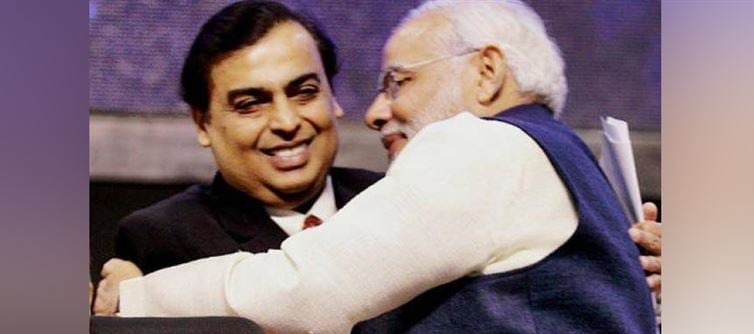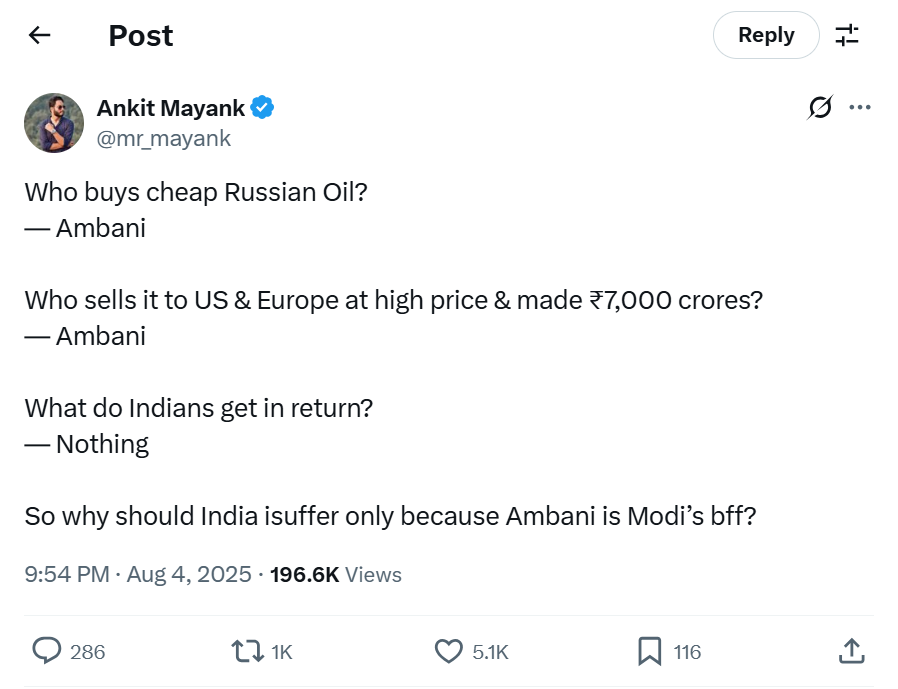
Public anger is mounting as revelations surface around reliance Industries, led by mukesh ambani, making massive profits by buying discounted Russian crude oil and selling refined products to the US and Europe, while indian consumers continue to bear the brunt of high fuel prices.
According to reports, reliance imported nearly 50% of its crude from russia at steep discounts, sometimes up to 30–40%. These imports are then processed in indian refineries and exported as diesel, petrol, and jet fuel to Western nations—earning profits close to ₹7,000 crore (€724 million) in early 2025 alone. Meanwhile, ordinary indians are left asking: What did we gain from this deal? The answer, many argue, is absolutely nothing.
 Despite India's access to cheaper crude, domestic fuel prices have not seen any significant relief. petrol still costs around ₹110 per litre, and what's worse, this is not even pure petrol—it includes 20% ethanol (E20), which reduces fuel efficiency and can potentially damage vehicle engines not designed for such blends.
Despite India's access to cheaper crude, domestic fuel prices have not seen any significant relief. petrol still costs around ₹110 per litre, and what's worse, this is not even pure petrol—it includes 20% ethanol (E20), which reduces fuel efficiency and can potentially damage vehicle engines not designed for such blends.
Citizens feel cheated, paying premium rates for a degraded product while private corporations rake in billions. The government's silence on the pricing formula and refusal to pass on the benefits of cheaper oil to the public have only deepened the sense of betrayal. Many are now questioning whether policies are designed to benefit citizens—or to enrich a powerful few.
This growing frustration is now being directed squarely at prime minister Narendra Modi, whose close ties with mukesh ambani are well-known. netizens are slamming the government for allowing what they perceive as a rigged economic setup, where public interest is sidelined in favor of corporate profits. Questions like “Why should india suffer because Ambani is Modi’s BFF?” are trending across social media platforms, reflecting the rising resentment. As the cost of living surges and savings shrink, citizens are demanding answers—and accountability. The contrast between corporate windfalls and public hardship is fueling a narrative of crony capitalism, where the lines between governance and business are dangerously blurred.
According to reports, reliance imported nearly 50% of its crude from russia at steep discounts, sometimes up to 30–40%. These imports are then processed in indian refineries and exported as diesel, petrol, and jet fuel to Western nations—earning profits close to ₹7,000 crore (€724 million) in early 2025 alone. Meanwhile, ordinary indians are left asking: What did we gain from this deal? The answer, many argue, is absolutely nothing.
 Despite India's access to cheaper crude, domestic fuel prices have not seen any significant relief. petrol still costs around ₹110 per litre, and what's worse, this is not even pure petrol—it includes 20% ethanol (E20), which reduces fuel efficiency and can potentially damage vehicle engines not designed for such blends.
Despite India's access to cheaper crude, domestic fuel prices have not seen any significant relief. petrol still costs around ₹110 per litre, and what's worse, this is not even pure petrol—it includes 20% ethanol (E20), which reduces fuel efficiency and can potentially damage vehicle engines not designed for such blends.Citizens feel cheated, paying premium rates for a degraded product while private corporations rake in billions. The government's silence on the pricing formula and refusal to pass on the benefits of cheaper oil to the public have only deepened the sense of betrayal. Many are now questioning whether policies are designed to benefit citizens—or to enrich a powerful few.
This growing frustration is now being directed squarely at prime minister Narendra Modi, whose close ties with mukesh ambani are well-known. netizens are slamming the government for allowing what they perceive as a rigged economic setup, where public interest is sidelined in favor of corporate profits. Questions like “Why should india suffer because Ambani is Modi’s BFF?” are trending across social media platforms, reflecting the rising resentment. As the cost of living surges and savings shrink, citizens are demanding answers—and accountability. The contrast between corporate windfalls and public hardship is fueling a narrative of crony capitalism, where the lines between governance and business are dangerously blurred.




 click and follow Indiaherald WhatsApp channel
click and follow Indiaherald WhatsApp channel